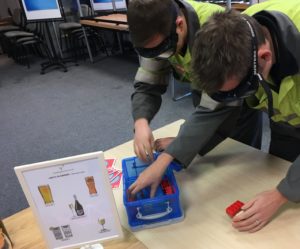Alcohol Awareness Week
This week over 1,700 community groups around the country are taking part in Alcohol Awareness Week – more than double the number that took part last year. Local authorities, workplaces, GP surgeries, pharmacies, hospitals, charities and other groups are organising events.
Raise awareness with the following hashtags #AlcoholAwarenessWeek and #AAW2018.
While alcohol harm has long been an issue in the UK, there has been a new resurgence in the will to tackle the harm from community and grassroots groups, as the UK has seen increasing levels of harm from liver disease while other developed countries have seen declines. At the same time, alcohol treatment services in the UK have been subject to severe cuts, making the picture all the worse for the more than 80% of alcohol dependent people not currently receiving help.
Alcohol Awareness Week is spearheaded by the new national charity Alcohol Change UK, which launched 19th November 2018, formed from the merger of Alcohol Concern and Alcohol Research UK. The charity, 19th November published a report outlining the current state of play for alcohol harm in the UK:
- In 2017, 20 people per day died as a result of their drinking, an increase of 11% since 2006.[i]
- Alcohol is the biggest risk factor for all early deaths among 15-49 year olds.
- There are around 600,000 alcohol-dependent people in the UK. Less than 20% of these people are getting the support they need.[ii]
- Since 2016 two-thirds of local authorities in England have cut their funding for alcohol services, many by over 50%.[iii]
- There are around 200,000 children in England living with a dependent parent or carer, and this can have lifelong negative effects.[iv]
- In England alone, alcohol costs the NHS an estimated £3.5 billion every year.[v]
- In 2017 there were 337,000 hospital admissions caused primarily by alcohol, which is 17% higher than in 2006. The total number of hospital admissions for which alcohol is a contributory factor is closer to one million: or about 7% of all hospital admissions.[vi]
- In 2015 167,000 years of working life were lost as a result of alcohol. The total social cost of alcohol to society is estimated to be at least £21 billion each year.[vii]
- Alcohol is linked to over 50% of all violent crime (and a much higher proportion in the evening and at weekends).
Alcohol Awareness Week aims to get people thinking and talking about alcohol, to motivate change at every level – individual, community and national. And it’s working. With over 1,700 community groups taking part in the week, almost every community around the country, should have at least one event taking place.
Andrew Harris, Client Wellbeing Manager at Healthy Performance, “The HP team are gearing up for a very busy Alcohol Awareness Week. We are delivering a number of educational and interactive alcohol awareness workshops. Our Beer goggle and guess the unit challenges are proving to be particularly popular with businesses who want to raise awareness as part of their wider company wellbeing strategy. Lost productivity due to alcohol use costs the UK economy £7 billion per year and more businesses are starting to take this subject very seriously. It’s not about telling people to stop drinking, it’s about making people more aware of the short and long-term dangers of excessive alcohol use. A full understanding of alcohol units and the low-risk drinking guidelines are still misunderstood by many people. Our services really engage the audience, we don’t preach, we try to keep things as interactive and fun as possible as this helps people learn. Once people know the facts they are then in a better position to make more informed decisions about their drinking behaviours.”
Beer Goggle Alcohol Awareness workshops

An example of the type of subject we discuss within an Alcohol Awareness Workshop.
A guide to show the effects of alcohol on sleep quality
Dr Richard Piper, Chief Executive of Alcohol Change UK, said:
“The situation with alcohol in the UK looks, at first glance, bleak. In 2017 20 people died each day as a result of their drinking. It’s not only individuals who are harmed; whole families, including the 200,000 children living with alcohol dependent parents, feel the effects of heavy drinking. In fact our whole society is impacted through the increased pressures on the NHS and other services. Many of us feel that drinking is an expectation rather than a choice.
“But there are signs that the tide is changing. The amount of alcohol drunk by young people is falling. Sales of no and low alcohol beer has increased 58% year-on-year[viii] – you’ve probably noticed the new sections in supermarkets! And communities across the country will be taking part in Alcohol Awareness Week. The time is ripe for serious change – to improve and save hundreds of thousands of lives.”
[i] Office for National Statistics (2017). Alcohol-specific deaths in the UK: registered in 2016.
[ii] Public Health England (2017). Adult substance misuse statistics from the NDTMS, April 2016 to March 2017.
[iii] Alcohol Research UK and Alcohol Concern (2018). The hardest hit: addressing the crisis in alcohol treatment services
[iv] Public Health England (2017). Estimates of alcohol dependent adults and alcohol dependent adults living with children.
[v] UK Parliament (2018). Alcoholic drinks – misuse: written question 170778
[vi] Health and Social Care Information Centre (2018). Statistics on alcohol, England 2018. pp. 6-11.
[vii] Public Health England (2016). Working years of life lost to alcohol: ad hoc statistical release; Office for National Statistics (2015). Violent crime and sexual offences – alcohol-related violence: findings from the 2013/14 Crime Survey for England and Wales; Public Health England (2016), Health matters: harmful drinking and alcohol dependence.
[viii] The Drinks Business (2018). Non-alcoholic beer sales see 60% boost in UK retail.











